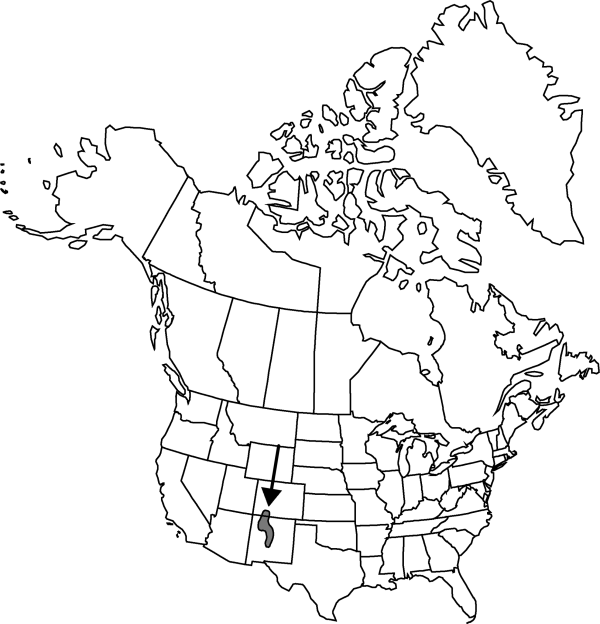Sclerocactus cloverae
Haseltonia 2: 31. 1994.
Stems unbranched (occasionally 2–3-branched near base), green, ovoid to elongate-cylindric, 2.9–25 (–35) × 2.8–12.5 (–20) cm; ribs usually (11–) 13 (–15), well developed, tubercles evident on ribs. Spines obscuring stems; radial spines 4–6 per areole, acicular, elliptic or rhombic in cross-section, 19 × 1.3–2 mm; central spines 6–9 per areole, usually 8; abaxial central spine usually 1 per areole, porrect, straw colored to brown, highlighted with purple or red, terete or somewhat angled, hooked, (15–) 30–46 × 1.5 mm; lateral central spines 5–8 per areole, similar to abaxial but slightly shorter and usually not hooked; adaxial central erect, white or straw colored, straight or curved, angled to flat, somewhat inconspicuous, triangular in cross-section, 25–55 × 1–2 mm. Flowers narrowly funnelform to campanulate, 2.5–3.5 (–4) × 1.6–3.1 (–3.6) cm; outer tepals with greenish to purple with brownish midstripes, pink, purple, or whitish margins, larger ones oblanceolate, 10–18 × 4–7.5 mm, margins membranous and crisped or minutely toothed, apex mucronate; inner tepals purple, sometimes suffused with brown, largest tepals oblanceolate, 15–22 (–30) × 4–6 mm, margins irregularly toothed, apex mucronate; filaments white, tinged with pink to pink-purple; anthers yellow; ovary minutely papillate, appearing smooth. Fruits irregularly dehiscent or dehiscent through basal abscission pore, green to tan, sometimes suffused with pink, 7–15 × 5–12 mm, dry; scales few, membranous, scarious-margined, minutely toothed or fringed. Seeds brown or black, 1.2–2.5 × 1.9–3.5 mm; testa with rounded papillae.
Habitat: Sandy, gravelly, or clay hills, mesas, and washes, desert grasslands, saltbush, sagebrush, and rabbitbrush flats, pinyon-juniper woodlands
Elevation: 1500-2200 m
Discussion
Sclerocactus cloverae is characterized by its very dense spines and small (relative to S. parviflorus) purple flowers. Phylogenetic analyses of chloroplast DNA sequences support a close relationship among S. cloverae, S. whipplei, and S. parviflorus (J. M. Porter et al. 2000). Populations with all reproductive individuals maintaining juvenile morphology have been segregated as S. cloverae subsp. brackii K. D. Heil & J. M. Porter.
Selected References
None.
